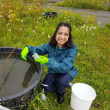Search
Filter by
Type
Tags
Dossiers
Themes
Departments
Active filters
1032 search results
Search results
-
Deciphering the role of fungal denitrifiers in N2O production from soils
The goal of this project is to decipher the role of fungal denitrifiers in N2O production from soils under sustainable management practices. Here we apply mesocosms experiments combined with SIP and meta-omics approaches targeting the functional genes of N cycle. In addition, we design primers for fungal denitrifiers based on complete fungal genomes and soil metagenomics data. -
The role of beneficial microbe in soil aggregation
The aim of this project is to determine the ecological relationship between bacteria and soil aggregates. We inoculate individual beneficial bacteria and different microbial communities from different natural soils in simulated Mars soil, attempting to explain their improvement in soil aggregate stability by bacterial exudates (EPS), necromass and microbial functional traits.
-
REPHORM - REcycled PHOsphorus Resolved by Microbes
Sufficient Phosphorus (P) and Iron (Fe) supply is essential for crop production. Most of the P and Fe in soil is not readily available for the plant, making agriculture depending on inorganic fertilizers mainly derived from depletable resources. An alternative to this unsustainable practice is to use recycled compounds recovered during wastewater treatment. This project focuses on the use of the two recycled compounds struvite (MgNH4PO4·6H2O) and vivianite (Fe3(PO4)2·8H2O) which are both insoluble and hard to synchronize with the nutrient needs during early plant development. To increase efficient nutrient release of these recycled sources, we propose the use of microbes that can solubilize P and release siderophore, both recognized traits of plant growth promoting microbes. Several plant growth-promoting microbes have been isolated, but their transfer to agriculture, so far, resulted in an inconsistent success, due to competition or resistance of the resident soil microbiome to inoculants. This project will circumvent this challenge by steering the local microbiome with the addition of recycled nutrients and will further optimize the microbiome by microbial community breeding. Overall, this project will focus on identifying microbial community members with struvite and vivianite solubilizing function, optimizing these communities, determining the role of these communities on increasing the nutrient release as well as monitoring the recruitment of these beneficial microbes in the rhizosphere and the effect on plant growth.
-
Cassandra van Altena
Postdoc
-
Maasheggen: unique field laboratory for agrobiodiversity
The Maasheggen area is a unique cultivated landscape in the Netherlands (near Boxmeer, province Noord-Brabant) and has been designated as a UNESCO biosphere reserve (https://www.maasheggenunesco.com/en/). Its mosaic of hedgerows, small arable fields and meadows make this a very interesting area to study the effects of land use and landscape elements on functional biodiversity and ecosystem services.
-
Hugo Langezaal
PhD Candidate -
Asmita Dubey
PhD Candidate
-
Lisenka de Vries
PhD Candidate
-
Microbes for plant health
Microbes can act as bodyguards for plants and can foster plant growth in other ways as well. At NIOO, we are digging into the mechanisms: in what ways do they interact? And how can we stimulate this, to make our agriculture more sustainable? Let's rewild our microbes!
-
SPI-Birds Network and Database
SPI-Birds Network and Database (www.spibirds.org) is a centralized and community-driven initiative that connects researchers working on wild bird populations in which individuals are uniquely marked and recognized. SPI-Birds makes research groups and their datasets visible, provides systematic data archiving, ensures data quality and integrity, and facilitates data sharing and comparative, cross-dataset analyses. For this purpose, we have developed a data standard and series of data quality checks agreed upon by the community, which adhere to the FAIR principles.
